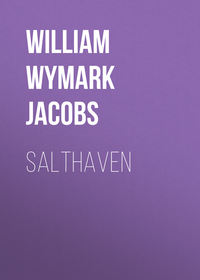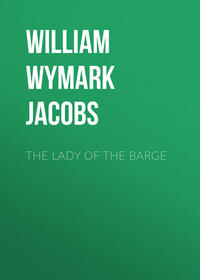 полная версия
полная версияOdd Craft, Complete
“Well, you’d better go back to it if you’re so fond of it,” ses ‘is wife.
“I think I ‘ad,” ses Dixon. “If I can’t be master in my own ‘ouse I’m better at sea, hard as it is. You must choose between us, Julia—me or your relations. I won’t sleep under the same roof as them for another night. Am I to go?”
“Please yourself,” ses ‘is wife. “I don’t mind your staying ‘ere so long as you behave yourself, but the others won’t go; you can make your mind easy on that.”
“I’ll go and look for another ship, then,” ses Dixon, taking up ‘is cap. “I’m not wanted here. P’r’aps you wouldn’t mind ‘aving some clothes packed into a chest for me so as I can go away decent.”
He looked round at ‘is wife, as though ‘e expected she’d ask ‘im not to go, but she took no notice, and he opened the door softly and went out, while old Burge, who ‘ad come into the room and ‘eard what he was saying, trotted off upstairs to pack ‘is chest for ‘im.
In two hours ‘e was back agin and more cheerful than he ‘ad been since he ‘ad come ‘ome. Bob was in the bar and the others were just sitting down to tea, and a big chest, nicely corded, stood on the floor in the corner of the room.
“That’s right,” he ses, looking at it; “that’s just wot I wanted.”
“It’s as full as it can be,” ses old Burge. “I done it for you myself. ‘Ave you got a ship?”
“I ‘ave,” ses Dixon. “A jolly good ship. No more hardships for me this time. I’ve got a berth as captain.”
“Wot?” ses ‘is wife. “Captain? You!”
“Yes,” ses Dixon, smiling at her. “You can sail with me if you like.”
“Thankee,” ses Mrs. Dixon, “I’m quite comfortable where I am.”
“Do you mean to say you’ve got a master’s berth?” ses Charlie, staring at ‘im.
“I do,” ses Dixon; “master and owner.”
Charlie coughed. “Wot’s the name of the ship?” he asks, winking at the others.
“The BLUE LION,” ses Dixon, in a voice that made ‘em all start. “I’m shipping a new crew and I pay off the old one to-night. You first, my lad.”
“Pay off,” ses Charlie, leaning back in ‘is chair and staring at ‘im in a puzzled way. “Blue Lion?”
“Yes,” ses Dixon, in the same loud voice. “When I came ‘ome the other day I thought p’r’aps I’d let bygones be bygones, and I laid low for a bit to see whether any of you deserved it. I went to sea to get hardened—and I got hard. I’ve fought men that would eat you at a meal. I’ve ‘ad more blows in a week than you’ve ‘ad in a lifetime, you fat-faced land-lubber.”
He walked to the door leading to the bar, where Bob was doing ‘is best to serve customers and listen at the same time, and arter locking it put the key in ‘is pocket. Then ‘e put his ‘and in ‘is pocket and slapped some money down on the table in front o’ Charlie.
“There’s a month’s pay instead o’ notice,” he ses. “Now git.”
“George!” screams ‘is wife. “‘Ow dare you? ‘Ave you gone crazy?”
“I’m surprised at you,” ses old Burge, who’d been looking on with ‘is mouth wide open, and pinching ‘imself to see whether ‘e wasn’t dreaming.
“I don’t go for your orders,” ses Charlie, getting up. “Wot d’ye mean by locking that door?”
“Wot!” roars Dixon. “Hang it! I mustn’t lock a door without asking my barman now. Pack up and be off, you swab, afore I start on you.”
Charlie gave a growl and rushed at ‘im, and the next moment ‘e was down on the floor with the ‘ardest bang in the face that he’d ever ‘ad in ‘is life. Mrs. Dixon screamed and ran into the kitchen, follered by old Burge, who went in to tell ‘er not to be frightened. Charlie got up and went for Dixon agin; but he ‘ad come back as ‘ard as nails and ‘ad a rushing style o’ fighting that took Charlie’s breath away. By the time Bob ‘ad left the bar to take care of itself, and run round and got in the back way, Charlie had ‘ad as much as ‘e wanted and was lying on the sea-chest in the corner trying to get ‘is breath.
“Yes? Wot d’ye want?” ses Dixon, with a growl, as Bob came in at the door.
He was such a ‘orrible figure, with the blood on ‘is face and ‘is beard sticking out all ways, that Bob, instead of doing wot he ‘ad come round for, stood in the doorway staring at ‘im without a word.
“I’m paying off,” ses Dixon. “‘Ave you got any-thing to say agin it?”
“No,” ses Bob, drawing back.
“You and Charlie’ll go now,” ses Dixon, taking out some money. “The old man can stay on for a month to give ‘im time to look round. Don’t look at me that way, else I’ll knock your ‘ead off.”
He started counting out Bob’s money just as old Burge and Mrs. Dixon, hearing all quiet, came in out of the kitchen.
“Don’t you be alarmed on my account, my dear,” he ses, turning to ‘is wife; “it’s child’s play to wot I’ve been used to. I’ll just see these two mistaken young fellers off the premises, and then we’ll ‘ave a cup o’ tea while the old man minds the bar.”
Mrs. Dixon tried to speak, but ‘er temper was too much for ‘er. She looked from her ‘usband to Charlie and Bob and then back at ‘im agin and caught ‘er breath.
“That’s right,” ses Dixon, nodding his ‘ead at her. “I’m master and owner of the Blue Lion and you’re first mate. When I’m speaking you keep quiet; that’s dissipline.”
I was in that bar about three months arterward, and I never saw such a change in any woman as there was in Mrs. Dixon. Of all the nice-mannered, soft-spoken landladies I’ve ever seen, she was the best, and on’y to ‘ear the way she answered her ‘usband when he spoke to ‘er was a pleasure to every married man in the bar.
A SPIRIT OF AVARICE
Mr. John Blows stood listening to the foreman with an air of lofty disdain. He was a free-born Englishman, and yet he had been summarily paid off at eleven o’clock in the morning and told that his valuable services would no longer be required. More than that, the foreman had passed certain strictures upon his features which, however true they might be, were quite irrelevant to the fact that Mr. Blows had been discovered slumbering in a shed when he should have been laying bricks.
“Take your ugly face off these ‘ere works,” said the foreman; “take it ‘ome and bury it in the back-yard. Anybody’ll be glad to lend you a spade.”
Mr. Blows, in a somewhat fluent reply, reflected severely on the foreman’s immediate ancestors, and the strange lack of good-feeling and public spirit they had exhibited by allowing him to grow up.
“Take it ‘ome and bury it,” said the foreman again. “Not under any plants you’ve got a liking for.”
“I suppose,” said Mr. Blows, still referring to his foe’s parents, and now endeavouring to make excuses for them—“I s’pose they was so pleased, and so surprised when they found that you was a ‘uman being, that they didn’t mind anything else.”
He walked off with his head in the air, and the other men, who had partially suspended work to listen, resumed their labours. A modest pint at the Rising Sun revived his drooping spirits, and he walked home thinking of several things which he might have said to the foreman if he had only thought of them in time.
He paused at the open door of his house and, looking in, sniffed at the smell of mottled soap and dirty water which pervaded it. The stairs were wet, and a pail stood in the narrow passage. From the kitchen came the sounds of crying children and a scolding mother. Master Joseph Henry Blows, aged three, was “holding his breath,” and the family were all aghast at the length of his performance. He re-covered it as his father entered the room, and drowned, without distressing himself, the impotent efforts of the others. Mrs. Blows turned upon her husband a look of hot inquiry.
“I’ve got the chuck,” he said, surlily.
“What, again?” said the unfortunate woman. “Yes, again,” repeated her husband.
Mrs. Blows turned away, and dropping into a chair threw her apron over her head and burst into discordant weeping. Two little Blows, who had ceased their outcries, resumed them again from sheer sympathy.
“Stop it,” yelled the indignant Mr. Blows; “stop it at once; d’ye hear?”
“I wish I’d never seen you,” sobbed his wife from behind her apron. “Of all the lazy, idle, drunken, good-for-nothing–”
“Go on,” said Mr. Blows, grimly.
“You’re more trouble than you’re worth,” declared Mrs. Blows. “Look at your father, my dears,” she continued, taking the apron away from her face; “take a good look at him, and mind you don’t grow up like it.”
Mr. Blows met the combined gaze of his innocent offspring with a dark scowl, and then fell to moodily walking up and down the passage until he fell over the pail. At that his mood changed, and, turning fiercely, he kicked that useful article up and down the passage until he was tired.
“I’ve ‘ad enough of it,” he muttered. He stopped at the kitchen-door and, putting his hand in his pocket, threw a handful of change on to the floor and swung out of the house.
Another pint of beer confirmed him in his resolution. He would go far away and make a fresh start in the world. The morning was bright and the air fresh, and a pleasant sense of freedom and adventure possessed his soul as he walked. At a swinging pace he soon left Gravelton behind him, and, coming to the river, sat down to smoke a final pipe before turning his back forever on a town which had treated him so badly.
The river murmured agreeably and the rushes stirred softly in the breeze; Mr. Blows, who could fall asleep on an upturned pail, succumbed to the influence at once; the pipe dropped from his mouth and he snored peacefully.
He was awakened by a choking scream, and, starting up hastily, looked about for the cause. Then in the water he saw the little white face of Billy Clements, and wading in up to his middle he reached out and, catching the child by the hair, drew him to the bank and set him on his feet. Still screaming with terror, Billy threw up some of the water he had swallowed, and without turning his head made off in the direction of home, calling piteously upon his mother.
Mr. Blows, shivering on the bank, watched him out of sight, and, missing his cap, was just in time to see that friend of several seasons slowly sinking in the middle of the river. He squeezed the water from his trousers and, crossing the bridge, set off across the meadows.
His self-imposed term of bachelorhood lasted just three months, at the end of which time he made up his mind to enact the part of the generous husband and forgive his wife everything. He would not go into details, but issue one big, magnanimous pardon.
Full of these lofty ideas he set off in the direction of home again. It was a three-days’ tramp, and the evening of the third day saw him but a bare two miles from home. He clambered up the bank at the side of the road and, sprawling at his ease, smoked quietly in the moonlight.
A waggon piled up with straw came jolting and creaking toward him. The driver sat dozing on the shafts, and Mr. Blows smiled pleasantly as he recognised the first face of a friend he had seen for three months. He thrust his pipe in his pocket and, rising to his feet, clambered on to the back of the waggon, and lying face downward on the straw peered down at the unconscious driver below.
“I’ll give old Joe a surprise,” he said to himself. “He’ll be the first to welcome me back.”
“Joe,” he said, softly. “‘Ow goes it, old pal?”
Mr. Joe Carter, still dozing, opened his eyes at the sound of his name and looked round; then, coming to the conclusion that he had been dreaming, closed them again.
“I’m a-looking at you, Joe,” said Mr. Blows, waggishly. “I can see you.”
Mr. Carter looked up sharply and, catching sight of the grinning features of Mr. Blows protruding over the edge of the straw, threw up his arms with a piercing shriek and fell off the shafts on to the road. The astounded Mr. Blows, raising himself on his hands, saw him pick himself up and, giving vent to a series of fearsome yelps, run clumsily back along the road.
“Joe!” shouted Mr. Blows. “J-o-o-oE!”
Mr. Carter put his hands to his ears and ran on blindly, while his friend, sitting on the top of the straw, regarded his proceedings with mixed feelings of surprise and indignation.
“It can’t be that tanner ‘e owes me,” he mused, “and yet I don’t know what else it can be. I never see a man so jumpy.”
He continued to speculate while the old horse, undisturbed by the driver’s absence, placidly continued its journey. A mile farther, however, he got down to take the short cut by the fields.
“If Joe can’t look after his ‘orse and cart,” he said, primly, as he watched it along the road, “it’s not my business.”
The footpath was not much used at that time of night, and he only met one man. They were in the shadow of the trees which fringed the new cemetery as they passed, and both peered. The stranger was satisfied first and, to Mr. Blows’s growing indignation, first gave a leap backward which would not have disgraced an acrobat, and then made off across the field with hideous outcries.
“If I get ‘old of some of you,” said the offended Mr. Blows, “I’ll give you something to holler for.”
He pursued his way grumbling, and insensibly slackened his pace as he drew near home. A remnant of conscience which had stuck to him without encouragement for thirty-five years persisted in suggesting that he had behaved badly. It also made a few ill-bred inquiries as to how his wife and children had subsisted for the last three months. He stood outside the house for a short space, and then, opening the door softly, walked in.
The kitchen-door stood open, and his wife in a black dress sat sewing by the light of a smoky lamp. She looked up as she heard his footsteps, and then, without a word, slid from the chair full length to the floor.
“Go on,” said Mr. Blows, bitterly; “keep it up. Don’t mind me.”
Mrs. Blows paid no heed; her face was white and her eyes were closed. Her husband, with a dawning perception of the state of affairs, drew a mug of water from the tap and flung it over her. She opened her eyes and gave a faint scream, and then, scrambling to her feet, tottered toward him and sobbed on his breast.
“There, there,” said Mr. Blows. “Don’t take on; I forgive you.”
“Oh, John,” said his wife, sobbing convulsively, “I thought you was dead. I thought you was dead. It’s only a fortnight ago since we buried you!”
“Buried me?” said the startled Mr. Blows. “Buried me?”
“I shall wake up and find I’m dreaming,” wailed Mrs. Blows; “I know I shall. I’m always dreaming that you’re not dead. Night before last I dreamt that you was alive, and I woke up sobbing as if my ‘art would break.”
“Sobbing?” said Mr. Blows, with a scowl. “For joy, John,” explained his wife.
Mr. Blows was about to ask for a further explanation of the mystery when he stopped, and regarded with much interest a fair-sized cask which stood in one corner.
“A cask o’ beer,” he said, staring, as he took a glass from the dresser and crossed over to it. “You don’t seem to ‘ave taken much ‘arm during my—my going after work.”
“We ‘ad it for the funeral, John,” said his wife; “leastways, we ‘ad two; this is the second.”
Mr. Blows, who had filled the glass, set it down on the table untasted; things seemed a trifle uncanny.
“Go on,” said Mrs. Blows; “you’ve got more right to it than anybody else. Fancy ‘aving you here drinking up the beer for your own funeral.”
“I don’t understand what you’re a-driving at,” retorted Mr. Blows, drinking somewhat gingerly from the glass. “‘Ow could there be a funeral without me?”
“It’s all a mistake,” said the overjoyed Mrs. Blows; “we must have buried somebody else. But such a funeral, John; you would ha’ been proud if you could ha’ seen it. All Gravelton followed, nearly. There was the boys’ drum and fife band, and the Ancient Order of Camels, what you used to belong to, turned out with their brass band and banners—all the people marching four abreast and sometimes five.”
Mr. Blows’s face softened; he had no idea that he had established himself so firmly in the affections of his fellow-townsmen.
“Four mourning carriages,” continued his wife, “and the—the hearse, all covered in flowers so that you couldn’t see it ‘ardly. One wreath cost two pounds.”
Mr. Blows endeavoured to conceal his gratification beneath a mask of surliness. “Waste o’ money,” he growled, and stooping to the cask drew himself an-other glass of beer.
“Some o’ the gentry sent their carriages to follow,” said Mrs. Blows, sitting down and clasping her hands in her lap.
“I know one or two that ‘ad a liking for me,” said Mr. Blows, almost blushing.
“And to think that it’s all a mistake,” continued his wife. “But I thought it was you; it was dressed like you, and your cap was found near it.”
“H’m,” said Mr. Blows; “a pretty mess you’ve been and made of it. Here’s people been giving two pounds for wreaths and turning up with brass bands and banners because they thought it was me, and it’s all been wasted.”
“It wasn’t my fault,” said his wife. “Little Billy Clements came running ‘ome the day you went away and said ‘e’d fallen in the water, and you’d gone in and pulled ‘im out. He said ‘e thought you was drownded, and when you didn’t come ‘ome I naturally thought so too. What else could I think?”
Mr. Blows coughed, and holding his glass up to the light regarded it with a preoccupied air.
“They dragged the river,” resumed his wife, “and found the cap, but they didn’t find the body till nine weeks afterward. There was a inquest at the Peal o’ Bells, and I identified you, and all that grand funeral was because they thought you’d lost your life saving little Billy. They said you was a hero.”
“You’ve made a nice mess of it,” repeated Mr. Blows.
“The rector preached the sermon,” continued his wife; “a beautiful sermon it was, too. I wish you’d been there to hear it; I should ‘ave enjoyed it ever so much better. He said that nobody was more surprised than what ‘e was at your doing such a thing, and that it only showed ‘ow little we knowed our fellow-creatures. He said that it proved there was good in all of us if we only gave it a chance to come out.”
Mr. Blows eyed her suspiciously, but she sat thinking and staring at the floor.
“I s’pose we shall have to give the money back now,” she said, at last.
“Money!” said the other; “what money?”
“Money that was collected for us,” replied his wife. “One ‘undered and eighty-three pounds seven shillings and fourpence.”
Mr. Blows took a long breath. “Ow much?” he said, faintly; “say it agin.”
His wife obeyed.
“Show it to me,” said the other, in trembling tones; “let’s ‘ave a look at it. Let’s ‘old some of it.”
“I can’t,” was the reply; “there’s a committee of the Camels took charge of it, and they pay my rent and allow me ten shillings a week. Now I s’pose it’ll have to be given back?”
“Don’t you talk nonsense,” said Mr. Blows, violently. “You go to them interfering Camels and say you want your money—all of it. Say you’re going to Australia. Say it was my last dying wish.”
Mrs. Blows puckered her brow.
“I’ll keep quiet upstairs till you’ve got it,” continued her husband, rapidly. “There was only two men saw me, and I can see now that they thought I was my own ghost. Send the kids off to your mother for a few days.”
His wife sent them off next morning, and a little later was able to tell him that his surmise as to his friends’ mistake was correct. All Gravelton was thrilled by the news that the spiritual part of Mr. John Blows was walking the earth, and much exercised as to his reasons for so doing.
“Seemed such a monkey trick for ‘im to do,” complained Mr. Carter, to the listening circle at the Peal o’ Bells. “‘I’m a-looking at you, Joe,’ he ses, and he waggled his ‘ead as if it was made of india-rubber.”
“He’d got something on ‘is mind what he wanted to tell you,” said a listener, severely; “you ought to ‘ave stopped, Joe, and asked ‘im what it was.”
“I think I see myself,” said the shivering Mr. Carter. “I think I see myself.”
“Then he wouldn’t ‘ave troubled you any more,” said the other.
Mr. Carter turned pale and eyed him fixedly. “P’r’aps it was only a death-warning,” said another man.
“What d’ye mean, ‘only a death-warning’?” demanded the unfortunate Mr. Carter; “you don’t know what you’re talking about.”
“I ‘ad an uncle o’ mine see a ghost once,” said a third man, anxious to relieve the tension.
“And what ‘appened?” inquired the first speaker. “I’ll tell you after Joe’s gone,” said the other, with rare consideration.
Mr. Carter called for some more beer and told the barmaid to put a little gin in it. In a pitiable state of “nerves” he sat at the extreme end of a bench, and felt that he was an object of unwholesome interest to his acquaintances. The finishing touch was put to his discomfiture when a well-meaning friend in a vague and disjointed way advised him to give up drink, swearing, and any other bad habits which he might have contracted.
The committee of the Ancient Order of Camels took the news calmly, and classed it with pink rats and other abnormalities. In reply to Mrs. Blows’s request for the capital sum, they expressed astonishment that she could be willing to tear herself away from the hero’s grave, and spoke of the pain which such an act on her part would cause him in the event of his being conscious of it. In order to show that they were reasonable men, they allowed her an extra shilling that week.
The hero threw the dole on the bedroom floor, and in a speech bristling with personalities, consigned the committee to perdition. The confinement was beginning to tell upon him, and two nights afterward, just before midnight, he slipped out for a breath of fresh air.
It was a clear night, and all Gravelton with one exception, appeared to have gone to bed. The exception was Police-constable Collins, and he, after tracking the skulking figure of Mr. Blows and finally bringing it to bay in a doorway, kept his for a fort-night. As a sensible man, Mr. Blows took no credit to himself for the circumstance, but a natural feeling of satisfaction at the discomfiture of a member of a force for which he had long entertained a strong objection could not be denied.
Gravelton debated this new appearance with bated breath, and even the purblind committee of the Camels had to alter their views. They no longer denied the supernatural nature of the manifestations, but, with a strange misunderstanding of Mr. Blows’s desires, attributed his restlessness to dissatisfaction with the projected tombstone, and, having plenty of funds, amended their order for a plain stone at ten guineas to one in pink marble at twenty-five.
“That there committee,” said Mr. Blows to his wife, in a trembling voice, as he heard of the alteration—“that there committee seem to think that they can play about with my money as they like. You go and tell ‘em you won’t ‘ave it. And say you’ve given up the idea of going to Australia and you want the money to open a shop with. We’ll take a little pub somewhere.”
Mrs. Blows went, and returned in tears, and for two entire days her husband, a prey to gloom, sat trying to evolve fresh and original ideas for the possession of the money. On the evening of the second day he became low-spirited, and going down to the kitchen took a glass from the dresser and sat down by the beer-cask.
Almost insensibly he began to take a brighter view of things. It was Saturday night and his wife was out. He shook his head indulgently as he thought of her, and began to realise how foolish he had been to entrust such a delicate mission to a woman. The Ancient Order of Camels wanted a man to talk to them—a man who knew the world and could assail them with unanswerable arguments. Having applied every known test to make sure that the cask was empty, he took his cap from a nail and sallied out into the street.
Old Mrs. Martin, a neighbour, saw him first, and announced the fact with a scream that brought a dozen people round her. Bereft of speech, she mouthed dumbly at Mr. Blows.
“I ain’t touch—touched her,” said that gentleman, earnestly. “I ain’t— been near ‘er.”
The crowd regarded him wild-eyed. Fresh members came running up, and pushing for a front place fell back hastily on the main body and watched breathlessly. Mr. Blows, disquieted by their silence, renewed his protestations.
“I was coming ‘long–”
He broke off suddenly and, turning round, gazed with some heat at a gentleman who was endeavouring to ascertain whether an umbrella would pass through him. The investigator backed hastily into the crowd again, and a faint murmur of surprise arose as the indignant Mr. Blows rubbed the place.









